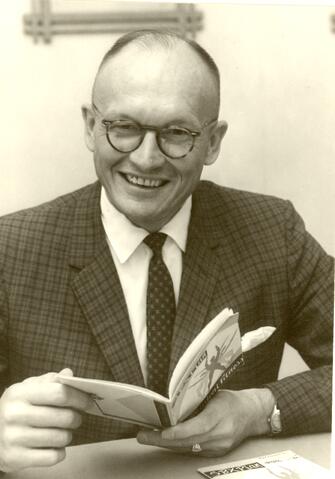
Title and statement of responsibility area
Title proper
Dr. Bill Orban and 5BX Plan
General material designation
- Graphic material
Parallel title
Other title information
Title statements of responsibility
Title notes
Level of description
Item
Reference code
Edition area
Edition statement
Edition statement of responsibility
Class of material specific details area
Statement of scale (cartographic)
Statement of projection (cartographic)
Statement of coordinates (cartographic)
Statement of scale (architectural)
Issuing jurisdiction and denomination (philatelic)
Dates of creation area
Date(s)
-
July 1962 (Creation)
Physical description area
Physical description
1 photograph. : b&w. ; 17 x 12 cm
Publisher's series area
Title proper of publisher's series
Parallel titles of publisher's series
Other title information of publisher's series
Statement of responsibility relating to publisher's series
Numbering within publisher's series
Note on publisher's series
Archival description area
Name of creator
Custodial history
Scope and content
Dr. Bill Orban, director, School of Physical Education, reads the 5BX plan he created.
Bio/Historical Note: Dr. William Robert Orban was born in 1922 in Regina, Saskatchewan. His parents were immigrants from Hungary. Dr. Orban played many sports at the Jesuit high school he attended. In 1941 he was offered a hockey scholarship to attend the University of California, Berkeley, where he initially studied engineering. Dr. Orban then attended the School of Physical Education at McGill University and graduated in 1949. He went on to complete a PhD in 1953 at the University of Illinois. Dr. Orban took a position at the Department of National Defence and created a fitness programme for Royal Canadian Air Force pilots, a third of whom were not considered fit to fly. In response to this brief he created the 5BX (5 Basic Exercises) plan for men and the XBX (10 Basic Exercise) plan for women. The plans were innovative in two respects. Firstly, they did not require access to specialized equipment. Many Air Force pilots were located in remote bases in northern Canada, with no access to these facilities, so it was important to offer a means of keeping fit without their use. Secondly, the plans only required 11 minutes (for men) or 12 minutes (for women) per day to be spent on the exercises. While studying the effect of exercise at the University of Illinois in the 1950s, Dr. Orban noticed when testing oxygen intake that long periods of exercise did not necessarily lead to significant improvement. This led him to the conclusion that the intensity of exercise was more important, than the amount of time spent on it. This aspect of the plan drew a negative reaction from others in the field but the 5BX programme proved its worth. 23 million copies of the booklets were sold and translated into 13 languages. The popularity of the programs in many countries around the world helped to launch modern fitness culture. Dr. Orban, as a public servant, received no additional income from the success of the plan.
Dr. Orban was himself a superb athlete, active in many sports of which football and hockey were his favourites. He played professional football with the Regina (now Saskatchewan) Roughriders (1941) and later with the Winnipeg Blue Bombers (1945), and was an excellent basketball player and boxer. Dr. Orban was a Junior A hockey player and continued to play hockey right up to age 60 and ran 14 kilometers every day until age 73.
In 1958 Dr. Orban became dean at its new Physical Education program at the University of Saskatchewan. While there he initiated the Saskatchewan Growth Study - a pioneering study of physical development in boys aged 7 to 17. In 1966 Dr. Orban returned to Ottawa to become a professor of the University of Ottawa's Human Kinetics department and became dean of that department in 1968, a position he occupied until 1976. He continued as a professor in Kinanthropology until his retirement in 1987. Dr. Orban died 18 October 2003 in Ottawa.
Notes area
Physical condition
Immediate source of acquisition
Arrangement
Language of material
Script of material
Location of originals
Availability of other formats
Restrictions on access
Terms governing use, reproduction, and publication
Photographer: Unknown
Other terms: Copyright owned by the University Archives.

